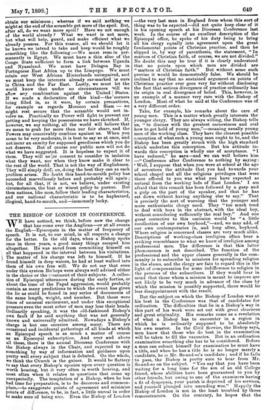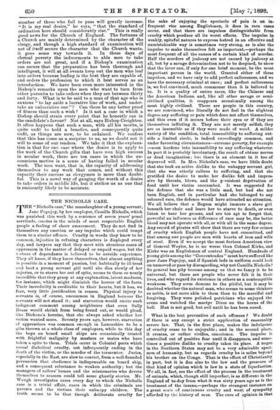THE BISHOP OF LONDON IN CONFERENCE.
WE have noticed, we think, before now the change that has come over the Anglican—or at all events the English—Episcopate in the matter of frequency of speech. It is not, to our mind, in all respects a change for the better. In the old days, when a Bishop spoke once in three years, a good many things escaped him altogether. He was saved from committing himself on all that happened in the interval between his visitations. The matter of his charge was left to himself. If he found himself in deep waters, he had at least walked into them of his own free will. We do not say that even under this system Bishops were always well advised either in the choice or the (:-eatment of their subjects. A collec- tion of Episcopal utterances during the early forties, or about the time of the Papal aggression, would probably contain as many predictions to which the event has given the lie as could be found in any series of documents of the same length, weight, and number. But these were times of unusual excitement, and under this exceptional pressure even the most sober of men may lose their heads. Ordinarily speaking, it was the old-fashioned Bishop's own fault if he said anything that was not generally known and universally admitted. Nowadays a Bishop's charge is but one occasion among many. There are occasional and incidental gatherings of all kinds at which an Episcopal speech is as much a matter of course as an Episcopal subscription. And over and above all these, there is the annual Diocesan Conference with the Bishop always in the Chair, and expected to say something by way of information and guidance upon pretty well every subject that is debated. On the whole, we think the Church is the gainer. It would be flattery to say that every Bishop's opinion upon every question is worth hearing, but it very often is worth hearing, and most often when it relates to questions that come up unexpectedly. The temptation of a Bishop, when he has had time for preparation, is to be decorous and common- place,—to exaggerate points of agreement and minimise points of difference, to be, in fact, a little unreal in order to make sure of being nice. Even the Bishop of London —the very last man in England from whom this sort of thing was to be expected—did not quite keep clear of it in his opening speech at his Diocesan Conference last week. In the course of an excellent description of the Episcopal office, he spoke of his duty being to bring all his clergy equally into agreement upon the great fundamental points of Christian practice, and then he slipped in, by way of parenthesis, the statement, "In matters of Christian faith, of course, we are not divided." No doubt this may be true if it is clearly understood that no points upon which men are divided are "matters of Christian faith." But without some such proviso it would be demonstrably false. We should be inclined to say that no sustained argument on points of Christian practice ever goes very far without disclosing the fact that serious divergence of practice ordinarily has its origin in real divergence of belief. This, however, is an example of a manner very rare with the Bishop of London. Most of what he said at the Conference was of a very different order.
Take, for example, his remarks about the care of young men. This is a matter which greatly interests the younger clergy. They are always willing, the Bishop tells us, "to discuss with the greatest earnestness and zeal how to get hold of young men,"—meaning usually young men of the working class. They have the clearest possible conception of what such a young man ought to be, and the Bishop has been greatly struck with the high standard which underlies this conception. But his attitude to- wards this conception is wholly one of acceptance. "I have reduced," he says—and we can well believe him —" Conference after Conference to nothing by saying: 'Well, I suppose that when you were at school at the age of seventeen the attitude that you had towards your school chapel and all the religious privileges that were there offered to you was what you have expected as natural from the working lads of East London.' I am afraid that this remark has been followed by a gasp and a gulp on the part of the speaker, and that he has sat down without having anything else to say." That is precisely the sort of warning that the younger and more enthusiastic clergy need. They "too much tend to deal with boys in the abstract, with the ideal boy, without considering sufficiently the real boy." And one great corrective to this omission would be "a little recollection of our own boyhood,"—and, we may add, of our own contemporaries in, and long after, boyhood. Where religion is concerned classes are very much alike. Descriptions of working-class irreligion often bear a. striking resemblance to what we know of irreligion among professional men. The difference is that this latter phenomenon is not described. The function of the professional and the upper classes generally in the com- munity is to subscribe to missions for spreading religion in the slums, and the clergy are fain to regard this in the light of compensation for some indifference to religion in the persons of the subscribers. If they would bear in mind that those whom a mission is meant to improve are not likely to be very much in advance of the class by which the mission is possibly supported, there would be less disappointment with the result.
But the subject on which the Bishop of London was at his best in the Conference was that of candidates for ordination. The difficulties that lie in a Bishop's way in this part of his work were set out with great clearness and great originality. His remarks come as a revelation of what a Bishop has to encounter in a region in which he is ordinarily supposed to be absolutely his own master. In the Civil Service, the Bishop says, men know that those who do best in the examination will be taken to fill the vacancies. But in an ordination examination something else has to be considered. Before a man can submit himself for examination he must have a title, and when he has a title he is no longer merely a candidate, he is Mr. So-and-so's candidate ; and if he fails to pass, the Bishop is pretty sure to hear from Mr. So-and-so on the subject. "You say that you have been waiting for a long time for the eon of an old College friend, whose abilities have been guaranteed to you by other friends, but owing to one of the examiners having a fit of dyspepsia, your parish is deprived of his services, and yourself plunged into unending woe." Happily the Bishop of London is not in the least troubled by these remonstrances. On the contrary, he hopes that the number of those who fail to pass will greatly increase. "It is my real desire," he says, "that the standard of ordination here should considerably rise." This is really good news for the Church of England. The fortunes of a Church are mainly determined by the character of the clergy, and though a high standard of examination will not of itself secure the character that the Church wants, it goes some way towards it. In these days of clerical poverty the inducements to able men to take orders are not great, and if a Bishop's examination can secure that the preparation has been thorough and intelligent, it will at all events keep out the men who loaf into orders because loafing is the best they are capable of, and orders the profession to which it best serves as an introduction. We have been even more interested in the Bishop's remarks upon the men who want to turn from other pursuits to take orders when they are between thirty and forty. What is to be said to a man of that age who is anxious "to lay aside a lucrative line of work, and under- take an unlucrative one"? Can there be any better proof Of fitness than such a wish ? Is it not a case in which a Bishop should strain every point that he honestly can in the candidate's favour? Not at all, says Bishop Creighton. It often happens that such a man, with all his merits, is quite unfit to hold a benefice, and consequently quite unfit, as things are now, to be ordained. We confess that this has come as a surprise to us, as we doubt not it will to some of our readers. We take it that the explana- tion is that for one case where the desire is to apply to the work of the Church gifts that have won high success in secular work, there are ten cases in which the un- conscious motive is a sense of having failed in secular work. The men want, that is, the capacity of addressing themselves to any work that comes, and without this capacity their success as clergymen is more than doubt- ful. This is a novel way of gauging the worth of a desire to take orders in middle life, but it strikes us as one that is eminently likely to be accurate.







































 Previous page
Previous page